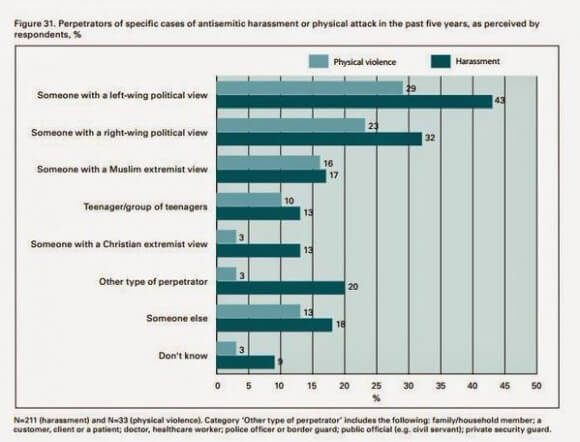Here we go again. A new study on Italian Jews from a British institute on Jewish policy completely conflates anti-Zionism with anti-Semitism, and says that the greatest anti-Semitic threat is from the left. And what is the nature of leftwing antisemitism? Well, it is a “spillover” from events in the Middle East.
The report… indicates that today [anti-Semitism] is more commonly grounded in political ideologies – from both the left and right – than in religious extremism, suggesting that it is driven both by old style right-wing nationalism, and newer forms of left-wing antipathy informed by a spill-over of incidents in Israel and the Middle East.
Yair Rosenberg is trumpeting the news: “Italian Jews report that most anti-Semitism comes not from Muslims or far-right, but the left.” Look at the graph on harassment incidents.

What does harassment mean? Lawrence Summers filled that in in the Harvard Crimson this week, when he said that leftwing critics of Israel on campus make supporters of Israel “feel that they are being attacked,” and in Summers’s view, that’s very dangerous indeed.
Of course Harvard as an institution and its leadership have no objective of demonizing Israel or supporting terrorists. Nonetheless, the failure to maintain controls sufficient to prevent activists from hijacking the University’s name and reputation in support of their objectives is a very serious issue and has led to concerns of community members who feel that they are being attacked. When Harvard allows its reputation to be attached to pernicious ideas, it raises the risk that they will be seen as legitimate in more and more places. And as the University intrudes into politics, the risks that political actors will seek to regulate its activities are enhanced…
There is nothing wrong with criticizing Israel, and I for one believe that aspects of its settlements policy are misguided and potentially dangerous. Yet the US State Department was correct when it stated in its “Anti-Semitism Monitor” that “while criticism of Israel cannot automatically be regarded as anti-Semitic, rhetoric that demonizes, delegitimizes, or applies double standards to Israel crosses the line of legitimate criticism.”
Here is that study on Italian Jews from the Institute for Jewish Policy Research. It says that one problem is that so many Jews now define their identity as, Support for Israel. (Just what Alice Rothchild said in New York.) So that “spillover” from the Middle East is inevitable. Emphasis mine:
The second major process at work has been the development of Israel as a central pole of reference and component of Jewish identity. In both internal and external
perceptions, it is impossible today to separate the Jewish community from discourse about Middle East processes and events, with significant consequences both for Jewish identity and for how Jews are perceived by non-Jews…
This is just what the Rev. Bruce Shipman was saying when he said that Israel’s actions are fostering anti-Semitism in Europe. He lost his job at Yale for making that point.
The British institute says Italian Jews agree with Lawrence Summers. It’s OK to criticize Israel, but when you start talking about boycott, that’s anti-Semitic.
[C]riticism of Israel by a non-Jew is considered to be “definitely antisemitic” by just 9% of respondents, and an additional 27% of respondents stated that it is “probably
antisemitic.” Thus, a clear majority (63%) feels that it is either definitely not, or probably not, antisemitic. However, when that criticism manifests itself in particular ways, respondents’ views become more acute. For example, half of all respondents consider someone who boycotts Israeli goods and products as “definitely” antisemitic, and a further third “probably antisemitic.” Bringing together Israel and Holocaust imagery raises alarm bells still further: close to two-thirds of all respondents think that when non-Jews state that Israelis behave “like Nazis” towards the Palestinians they are “definitely antisemitic”, and a further quarter thinks that they are “probably antisemitic” (see Figure 24). In short, criticism of Israel in and of itself is not seen as a factor that makes a non-Jew antisemitic in the eyes of most survey respondents; rather, it is the precise content and tone of the criticism that matter
Thanks to Scott Roth.



I for one believe that aspects of its settlements policy are misguided and potentially dangerous
I for one believe that aspects of rape and murder are misguided and potentially dangerous.
I only “Attack” (not my word) Jews/non Jews who support any form of oppression .That some Jews are involved in and support Israel,s actions is just incidental and they get lumped together with all others who refuse to speak out against or carry out or support such crimes.
Giving Jews a pass because they are Jews would be antisemitic, as I see it.
If your identity is so wrapped up into one state you should ask yourself: why don’t I live there.
Gee, I wonder why intermarriage is increasing when people have a Jewish identity where love of a country they don’t even live in is central for so many. How is that even a glue?
Why would the British institute on Jewish policy carry out a study Italian attitudes to Jews.Is there a Italian institute on Jewish policy study of British attitudes to Jews .
Maybe there is an Irish institute of Jewish policy study of Japanese attitudes to Jews.
Wouldn,t such studies be more credible if carried out by Jews in their respective homelands.
This is a great way to raise the specter of rising antisemitism and keep it going ad infinitum.A sign of desperate times for the zios.
RE: “The British institute says Italian Jews agree with Lawrence Summers. It’s OK to criticize Israel, but when you start talking about boycott, that’s anti-Semitic.”
Accepting this criterion makes it pretty easy to sling the ant-Semitism charge. But Summers make it even easier when he accepts the State Department’s claim that,
“[anyone who] applies double standards to Israel crosses the line of legitimate criticism.”
The effect of this is that unless you first have criticized every repressive regime worldwide, your criticisms of Israel are not “legitimate” and since this idea is stated in the context of defining anti-Semitism, such criticism must be ant-Semitic. This is propaganda in its purest form. There are hugely important reasons why I, as an American, should and do abhor and object to Israel’s behavior that do not apply to North Korea or the Sudan.